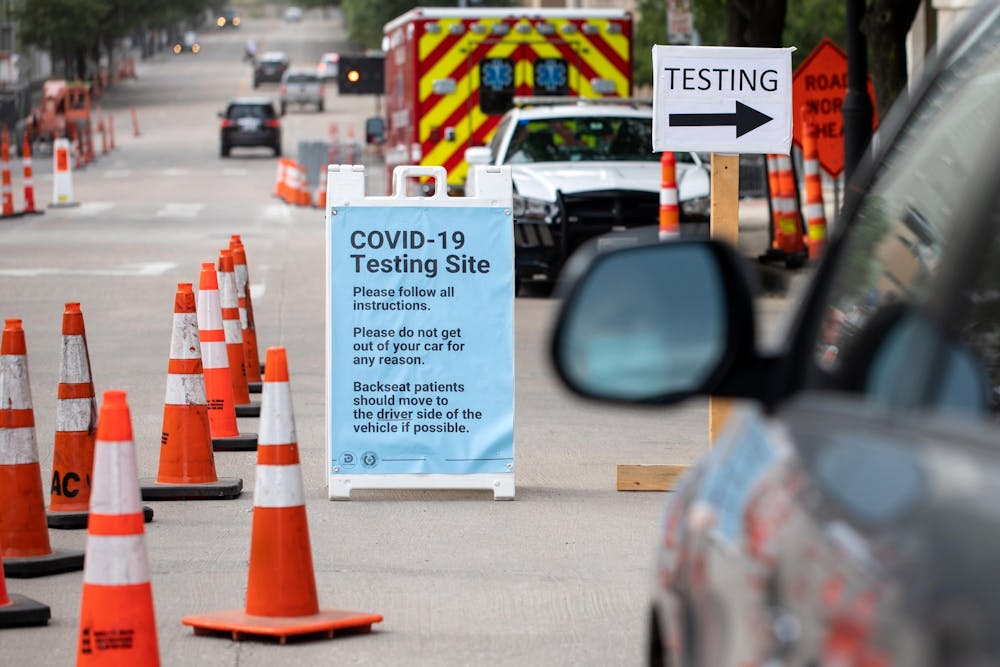There are numbers too big for people to comprehend: at some point, the human brain simply shrugs and says, “It’s a lot.” That’s why we have TikToks translating the net worth of billionaires into grains of rice, data visualization software, graphs and graphics and charts, all neatly packaged to try to clarify exactly how much “a lot” is.
I thought about this while eating a Dove chocolate and idly wondering how many are produced per year. When I read the little message printed on the inside — “Everyone has a happy ending. If you’re not happy, it’s not the end” — my mind turned to the COVID-19 pandemic, which has denied over 200,000 Americans happy endings.
In the United States, empathy has become a partisan value, when in fact it should be a human one. This is a national emergency, a national time of grief, and a national time of mobilization in and outside of government regardless of political leanings. Rent freezes, eviction bans, universal healthcare, regular stimulus checks, and more serious lockdown measures should be no-brainers because these are the policies that would help the people who are most at risk. Unfortunately, we have seen shaky measures at best because the question has become not, “What can the government do?” but rather, “Should the government do anything at all?”
On a personal level, I have seen the effects empathy can have on my well-being as a student. One of my professors has taken care to emphasize that students’ wellbeing comes before any assignment. This made me feel supported. Another professor, however, suggested that students spend all the additional time gained from not having on-campus “distractions” to work on research projects. The latter neglected to take into effect the fatigue online learning causes and the dark reality of life off-screen — the massive, incomprehensible amount of death we have experienced.
Many of those who passed away were alone in hospital beds, at home, or in the streets. Beloved partners, children, siblings, friends. People who took precautions and people who did not. Disproportionately members of Black and Latinx communities. No visual can encompass the weight of their lives or the memories and the broken families they have left behind.
Despite this incomprehensible death toll, the Trump administration has failed to show the slightest bit of remorse, or even acknowledge the deadly threat the pandemic poses. This indicates that the malaise within our political system goes far deeper than incompetence, far deeper than partisanship — it is founded upon a shocking lack of empathy, which should not be considered a “partisan trait,” but rather universally fundamental.
It didn’t have to be this way. The United States leads the world in COVID-19 cases and deaths: other countries show us that the effects of the pandemic could have been mitigated. Instead of action, the federal government subjects us to more lies and leaves state governments to scramble (or to ignore the crisis as well). There have been lies to incite racist violence against Asian Americans, lies that a quick vaccine is a certitude, lies that the pandemic isn’t a serious problem, lies to cover up previous lies. Some suspect that this messaging is tailored to help President Trump’s chances at reelection in November, but the reality is that a president who has empathy would do nothing of the sort.
Two hundred thousand: read this number once, and then read it again. Try to imagine it. Perhaps in groups of 100 people seated in an auditorium. You would have to imagine 2,000 auditoriums. Alternatively, you can picture two large football stadiums that seat 100,000 people each. I try to imagine my hometown, Richmond, Va., if 88 percent of the population was gone. The number is still going up daily.
Now, President Donald Trump, First Lady Melania Trump, and others in Trump’s circle have tested positive for COVID-19 following a nomination ceremony for Judge Amy Coney Barrett; this superspreader event has since been labeled the Rose Garden Massacre. Most attendees neither wore masks nor practiced social distancing. On Twitter, Trump’s supporters comment to wish him a speedy recovery. This highlights the decidedly partisan character of empathy, as neither the President nor his supporters took COVID-19 seriously before it could no longer be deemed a hoax or someone else’s problem.
We cannot let the people lost to COVID-19 be forgotten nor pretend that this was inevitable. We have to memorialize, celebrate, and respect them by never letting a public health crisis of this magnitude occur again. And a crucial part of that is making empathy a basic value of our political culture. Profit and convenience should never take precedence over people, and people should never be so broadly accepted as mass-produced and disposable.
Brittani Telfair is a junior from Richmond, Va., majoring in the School of Public and International Affairs. She can be reached at btelfair@princeton.edu.









